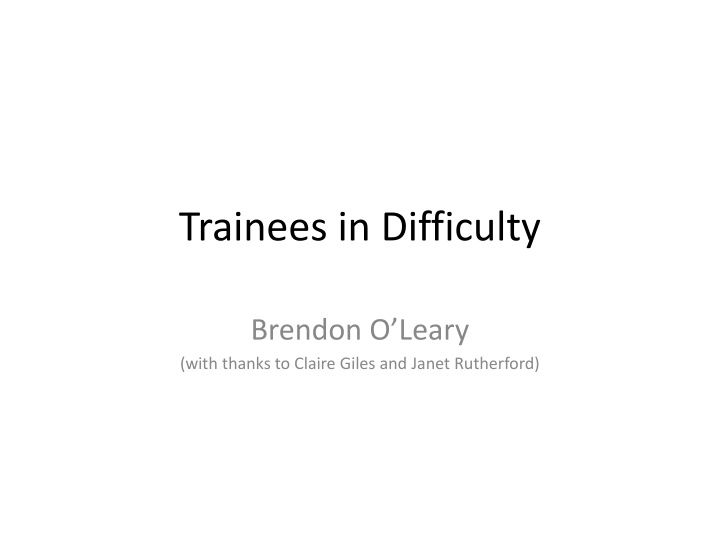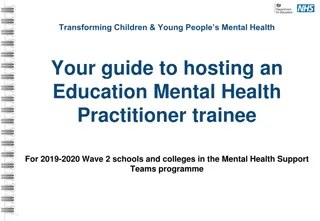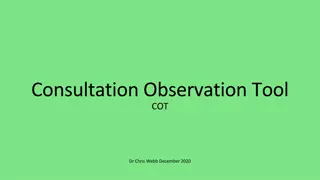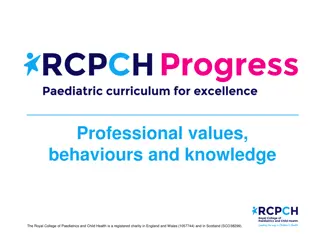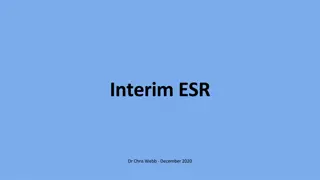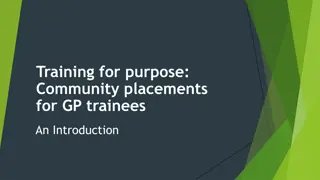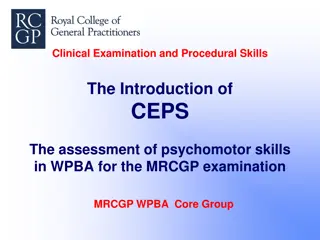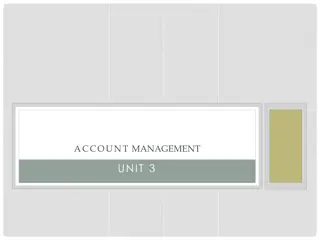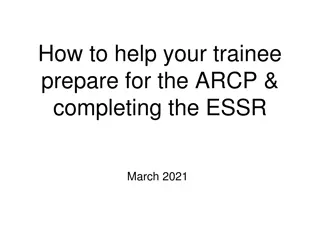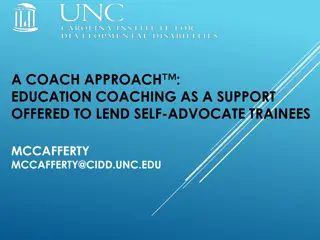Trainees in Difficulty
Trainees in Difficulty discuss the challenges faced by trainees who are not meeting requirements and explore potential factors such as health issues, personal difficulties, or learning struggles. It emphasizes the importance of identifying problems, gathering evidence, and looking for underlying causes to provide effective support and guidance. The content also delves into the role of trainers in understanding their impact and fostering a supportive environment for struggling trainees.
Uploaded on Feb 21, 2025 | 6 Views
Download Presentation

Please find below an Image/Link to download the presentation.
The content on the website is provided AS IS for your information and personal use only. It may not be sold, licensed, or shared on other websites without obtaining consent from the author.If you encounter any issues during the download, it is possible that the publisher has removed the file from their server.
You are allowed to download the files provided on this website for personal or commercial use, subject to the condition that they are used lawfully. All files are the property of their respective owners.
The content on the website is provided AS IS for your information and personal use only. It may not be sold, licensed, or shared on other websites without obtaining consent from the author.
E N D
Presentation Transcript
Trainees in Difficulty Brendon O Leary (with thanks to Claire Giles and Janet Rutherford)
TiD definition A trainee in difficulty is one whose progress is causing concern or who is not meeting curricular requirements. This may be due to ill health, life events, difficulties with learning or through less than satisfactory professional conduct.
Trainees in Difficulty Don t assume that a trainee who performs badly is a bad trainee The trainer needs to be humble enough to explore their own potential role in this
Identifying the struggling trainee RDMp helps identify problems with PERFORMANCE SKIPE is a framework that can be used to help identify .. CAUSAL/INFLUENTIAL FACTORS
Steinert 2008:BMJ 336, 150-153 Where does the problem lie? Unsupportive Overly critical Unreasonable expectations Disinterested Non challenging Failure to meet learner s needs Teacher Work (e.g. workload, unsupportive staff) Social (e.g. marital, financial) Personal (e.g. substance abuse, illness) Training (e.g. unsupportive VTS, lack of guidance) Knowledge Skills Attitudes Learner Environment
RDM-p relate to someone, diagnose their needs, manage the process, and at all times ensure you act professionally. Tim Norfolk
Evidencing May start as gut feeling but try to evidence with clear statement of areas of concern Collect evidence from several sources: Verbal statements from others: Written statements from others: Things you have noticed: This may be K, S & A Record the specifics of the event. Things the trainee has noticedthat they have difficulty with
Trainees in Difficulty Looking for the Cause Skills and Knowledge Don t jump off into deeper issues until the SK issues have been properly tested. BUT we tend to concentrate on SK as we are more familiar with that and ignore other factors.
Trainees in Difficulty Looking for the Cause Discussions with the trainee
Trainees in Difficulty Looking for the Cause Discussions with the trainee Keep open and non-judgemental Establish an equal relationship based on honesty and respect Avoid assumptions Consider learning styles Include the trainee s perspective, not just the evidence you have gathered Explore their goals Use motivational interviewing
Trainees in Difficulty Looking for the Cause Ways to achieve an adult-adult relationship
Trainees in Difficulty Looking for the Cause Ways to achieve an adult-adult relationship Establish a safe environment comfortable, open and honest Start low and go slow Build an accurate picture together Validate feelings and explore specifics before suggesting a trainee s perceptions needs adjusting Encourage reflection and self-evaluation Develop a joint management plan
Trainees in Difficulty Looking for the Cause Preventing Conflict
Trainees in Difficulty Looking for the Cause Preventing Conflict Ensure good feedback skills Establish the supportive purpose of the session Build rapport initially by stressing the positives When moving onto a trickier area, explore the trainee s perspective initially, avoid judgemental words, use Socratic questioning Watch verbals and non-verbals Tread carefully, be sensitive and validate feelings
Trainees in Difficulty Looking for the Cause SID Framework S = Share your concerns Colleagues, TPD, Deanery I = Involve the trainee Always 2 sides to a story D = Document Detailed, factual, accurate, relevant, objective and justifiable. Use descriptive, specific and non-judgemental language
Coming up with a plan: Poor Knowledge
Coming up with a plan: Poor Knowledge Identify if general or specific Get the trainee to evaluate their own knowledge using Curriculum Self-assessment rating scale, MCQ websites, PEP etc Do lots of RCA RCGP Essential Knowledge Challenge Get them to help out in nurse-led chronic disease clinics Look at the AKT feedback as well as their results Consider an AKT course Consider small study groups to share the work Cram stats
Coming up with a plan: Poor Motivation
Coming up with a plan: Poor Motivation Stephen Covey s The Seven Habits of Effective People find out what the trainee sees themselves doing in the future NLP core values and the wheel of life Motivational interviewing Role modelling share with them how you deal with your own difficulties
Coming up with a plan: Constantly Uncertain/ Can t Make Decisions
Coming up with a plan: Constantly Uncertain/ Can t Make Decisions Explore complexity theory competence, capability, complexity, certainty and chaos Encourage them to explore ICE with the patient Encourage them to discuss dilemmas with pts and aim for shared decision making Don t give them the answers every time they ask facilitate them finding the answer themselves Encourage them to start learning in a non-linear way
Coming up with a plan: Lacking Confidence
Coming up with a plan: Lacking Confidence As before, but a bit more! Establish where they are on the transition curve Make sure they have enough clinical experience with effective feedback Encourage reflection Encourage them to find answers for themselves Encourage them to discuss their anxieties with their peers
Coming up with a plan: The Muddly Consulter
Coming up with a plan: The Muddly Consulter Establish an agenda and encourage screening Signpost and summarise Work on systematic problem-solving skills Video regularly, stop a consultation every 2mins What was going on in your head then? Joint surgeries, taking turns to lead, making your reasoning explicit Create some discomfort by shortening their consultation timings
Coming up with a plan: Common Themes Review your approach regularly Ensure pt safety, and be explicit about that Debriefs, nominated supervisor for every surgery Regular random case analysis, videoing, joint surgeries Role play as a way of reinforcing altered behaviour Increase number CBDs and COTs Give praise where due and be prepared to challenge too Encourage reflection and self-evaluation Timetable regular reviews Talk, talk, talk and share your concerns with others DOCUMENT
